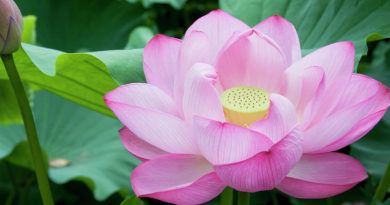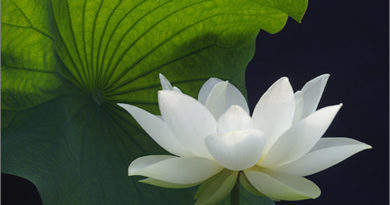Volume Iv –– Saḷāyatanavaggo Samyutta 34 –– Saḷāyatana Saṃyutta Chapter 14 –– Devadaha Vaggo
Sutta Pitaka
Samyutta Nikāya
Volume IV –– Saḷāyatanavaggo
Samyutta 34 –– Saḷāyatana Saṃyutta
Chapter 14 –– Devadaha Vaggo
34. 14. 1.
(134) Devadahakhano –– At Devadaha (The Right Moment)
1. At one time the Blessed One was living in Devadaha, a hamlet of the Sakyas.
2. The Blessed One addressed the monks from there: “Monks, I do not say that all monks should be diligent in the six spheres of mental contact nor do I say that all monks should not be diligent in the six spheres of mental contact.”
3. “Those monks who are worthy have destroyed desires, lived the holy life to the end, done their duties, have put down the weight, attained the highest good, have destroyed the bond ‘to be’ and are released rightfully knowing; to them it is not necessary to say to be diligent in the six doors of mental contact. What is the reason?
4. “They have done their duties diligently and it is not possible that they be negligent.
5. “Monks, those monks who are trainees, have not attained their aim yet and abiding with a wish to end unpleasantness, to them I say, should be diligent in the six spheres of mental contact. What is the reason?
6. “Monks, to them there are pleasant and unpleasant forms cognizable by eye-consciousness with the contact of which, their minds are not taken possession completely, as a result they have unshaken, aroused effort, unconfused mindfulness established, the body composed, not angry and the mind concentrated in one point; seeing immediate results for them, I say they should be diligent in the six doors of mental contact.
7––10. Repeat. “Monks, to them are pleasant and unpleasant sounds, re scents re tastes, re and touches, cognizable by body-consciousness with the contact of which their minds are not taken possession completely, as a result they have unshaken and aroused effort, unconfused mindfulness established, the body composed, not angry and the mind concentrated in one point, seeing immediate results for them, I say they should be diligent in the six doors of mental contact.
11. “Monks, to them are pleasant and unpleasant ideas cognizable by mind-consciousness with the contact of which their minds are not taken possession completely, as a result they have unshaken, aroused effort with unconfused mindfulness established; the body composed, not angry and the mind concentrated in one point; seeing immediate results for them, I say they should be diligent in the six doors of mental contact.
34. 14. 2.
(135) Saṅgayha –– Seizing completely
1. At one time the Blessed One was living in Devadaha, a hamlet of the Sakyas.
2. The Blessed One addressed the monks from there: “Monks, it is a rare chance; you have gained the right moment to lead the holy life.
3. “Monks I have seen the hell called the six spheres. There, whatever forms seen are only unpleasant, never pleasant, always unwelcome, never welcome, always displeasing never pleasing. Whatever sounds heard, re scents scented, re savories tasted, re touches contacted and ideas cognized are only unpleasant, never pleasant, always unwelcome, never welcome, always displeasing, never pleasing.
“Monks, it is a rare chance; you have gained the right moment to lead the holy life.
4. “Monks I have seen the heaven called the six spheres. There, whatever forms seen are only pleasant never unpleasant, always welcome never unwelcome, always pleasing never displeasing. Whatever sounds heard re scents scented, re savories tasted, re touches contacted and ideas cognized are only pleasant never unpleasant always welcome never unwelcome, always pleasing never displeasing.
“Monks, it is a rare chance; you have gained the right moment to lead the holy life.”
34. 14. 3.
(136) Agayha –– Not Seizing
1. At one time the Blessed One was living in Devadaha, a hamlet of the Sakyas.
2. The Blessed One addressed the monks from there: “Monks, gods and men rejoice seeing forms, when forms change, lose interest and cease, gods and men abide unpleasantly. Monks, gods and men rejoice hearing sounds, re scenting scents, re tasting savories re cognizing touches and cognizing ideas. When ideas change, lose interest and cease, gods and men abide unpleasantly.
3. “Monks, the Thus Gone One worthy and rightfully enlightened knowing, as it really is, the arising, fading, satisfaction, danger and the escape from forms, does not delight in, get attached to and take pleasure in forms. Monks, when forms change, lose interest and cease the Thus Gone One abides pleasantly. Monks, the Thus Gone One worthy and rightfully enlightened knowing, as it really is, the arising, fading, satisfaction, danger and the escape from sounds re scents re savories re touches and ideas does not delight in, get attached to and take pleasure in ideas. Monks, when ideas change, lose interest and cease the Thus Gone One abides pleasantly.”
4. The Teacher further said:
“Forms, sounds, scents, savories, touches and ideas
Are agreeable and welcomed, when as desired. 1
Gods and humans agree that they are pleasant,
When they cease it is considered unpleasant 2
Noble ones see the cessation of the self, as pleasant
It’s different from the view of the worldling. 3
Pleasant things are unpleasant to the noble ones
Unpleasant things are pleasant to the noble ones 4
The foolish are confused and ignorant,
And do not understand the Teaching 5
To the mindful and clever the Teaching,
Is clear as though seeing a light. 6.
By those going with the stream ‘to be’,
And in the domains of Death,
It is difficult to understand the Teaching 7
All do not understand enlightenment,
The extinguishing, without desires. 8
5. “Monks, gods and men rejoice seeing forms, when forms change, lose interest and cease, gods and men abide unpleasantly. Monks, gods and men rejoice hearing sounds re scenting scents re tasting savories re cognizing touches and cognizing ideas. When ideas change, lose interest and cease, gods and men abide unpleasantly.
6. “Monks, the Thus Gone One worthy and rightfully enlightened knowing, as it really is the arising, fading, satisfaction, danger and the escape from forms, does not delight in, get attached to and take pleasure in forms. Monks, when forms change, lose interest and cease the Thus Gone One abides pleasantly. Monks, the Thus Gone One worthy and rightfully enlightened knowing, as it really is, the arising, fading, satisfaction, danger and the escape from sounds re scents re savories re touches and ideas does not delight in, get attached to and take pleasure in ideas. When they change, lose interest and cease the Thus Gone One abides pleasantly.”
34. 14. 4.
(137) Gayha Sutta ––
<Translation needed>
34. 14. 5.
(138) Palāsinā –– With Mercy
1. At one time the Blessed One was living in Devadaha, a hamlet of the Sakyas.
2. The Blessed One addressed the monks from there: “Monks give up that which is not yours, it will be for your welfare and pleasantness. What is not yours?
3––8. “Monks, the eye is not yours, dispel it for your welfare and happiness. The ear, nose, tongue, body, and mind is not yours, dispel them for your welfare and happiness.
9. “Monks, if people carry away, burn or do what they like to the grass, sticks, branches and leaves in Jeta’s grove would it occur to you the people are carrying away, burning and doing what they like to us?”
“No, venerable sir, that’s not so.”
“What is the reason?”
“Venerable sir, they are not the self, or the belongings of the self.”
10. “In the same manner, monks, the eye is not yours, dispel it for your welfare and happiness. The ear, nose, tongue, body, and mind is not yours, dispel them for your welfare and happiness.”
34.14. 6.
(139) Palāsinā 2 –– With Mercy 2
1. At one time the Blessed One was living in Devadaha, a hamlet of the Sakyas.
2. The Blessed One addressed the monks from there: “Monks give up that which is not yours, it will be for your welfare and pleasantness. What is not yours?
3––8. “Monks, forms are not yours, dispel them for your welfare and happiness. Sounds, scents, savories, touches and ideas are not yours, dispel them for your welfare and happiness.
9. “Monks, if people carry away, burn or do what they like to the grass, sticks, branches and leaves in Jeta’s grove would it occur to you the people are carrying away, burning and doing what they like to us?”
“No, venerable sir, that’s not so.”
“What is the reason?”
“Venerable sir, they are not the self, or the belongings of the self.”
10. “In the same manner, monks, forms are not yours, dispel them for your welfare and happiness. The sounds, scents, savories, touches and ideas are not yours, dispel them for your welfare and happiness.”
34. 14. 7.
(140) Hetunā ajjhatta 1 –– With selfish reasons 1
1. At one time the Blessed One was living in Devadaha, a hamlet of the Sakyas
2. The Blessed One addressed the monks from there:
3. “Monks the eye is impermanent, so also the reasons on account of which the eye arose are impermanent, so how could the eye be permanent?
4. “Monks the ear is impermanent, so also the reasons on account of which the ear arose are impermanent, so how could the ear be permanent?
5. Repeat for the nose.
6. “Monks the tongue is impermanent, so also the reasons on account of which the tongue arose are impermanent, so how could the tongue be permanent?
7. Repeat for the body.
8. “Monks the mind is impermanent, so also the reasons on account of which the mind arose are impermanent, so how could the mind be permanent?
9. “Monks, the learned noble disciple seeing it thus turns from the eye, ear, nose, tongue, body and the mind. Turning loses interest and knows there is nothing more to wish.”
34. 14. 8.
(141) Hetunā ajjhatta 2 –– With Selfish Reasons 2
1. At one time the Blessed One was living in Devadaha, a hamlet of the Sakyas.
2. The Blessed One addressed the monks from there:
3. “Monks the eye is unpleasant, so also the reasons on account of which the eye arose are unpleasnt, so how could the eye be pleasant?
4. “Monks the ear is unpleasant, so also the reasons on account of which the ear arose are unpleasant, so how could the ear be pleasant?
5. Repeat for the mose.
6. “Monks the tongue is unpleasant, so also the reasons on account of which the tongue arose are unpleasant, so how could the tongue be pleasant?
7. Repeat for the body.
8. “Monks the mind is unpleasant, so also the reasons on account of which the mind arose are unpleasant, so how could the mind be pleasant?
9. “Monks, the learned noble disciple seeing it thus turns from the eye, ear, nose, tongue, body and the mind. Turning loses interest and knows there is nothing more to wish.
34. 14. 9.
(142) Hetunā ajjhatta 3 –– With Selfish Reasons 3
1. At one time the Blessed One was living in Devadaha, a hamlet of the Sakyas.
2. The Blessed One addressed the monks from there:
3. “Monks the eye lacks self, so also the reasons on account of which the eye arose lack self, so how could the eye be self?
4. “Monks the ear lacks self, so also the reasons on account of which the ear arose lack self, so how could the ear be self?
5. Repeat for the nose.
6. “Monks the tongue lacks self, so also the reasons on account of which the tongue arose lack self, so how could the tongue be self?
7. Repeat for the body.
8. “Monks the mind lacks self, so also the reasons on account of which the mind arose lack self, so how could the mind be self?
9. “Monks, the learned noble disciple seeing it thus turns from the eye, ear, nose, tongue, body and the mind. Turning loses interest and knows there is nothing more to wish.”
34. 14. 10.
(143) Hetunā Bahirā 1 –– With External Reasons 1
1. At one time the Blessed One was living in Devadaha, a hamlet of the Sakyas.
2. The Blessed One addressed the monks from there:
3. “Monks forms are impermanent, so also the reasons on account of which forms arose are impermanent, so how could forms be permanent?
4. “Monks sounds are impermanent, so also the reasons on account of which sounds arose are impermanent, so how could sounds be permanent?
5. Repeat for scents
6. “Monks tastes are impermanent, so also the reasons on account of which tastes arose are impermanent, so how could tastes be permanent?
7. Repeat for touches.
8. “Monks ideas are impermanent, so also the reasons on account of which ideas arose are impermanent, so how could ideas be permanent?
9. “Monks, the learned noble disciple seeing it thus turns from forms, sounds, scents, tastes, touches and ideasṬurning loses interest and knows there is nothing more to wish.
34. 14. 11.
(144) Hetunā bāhira 2 –– With External Reasons 2
1. At one time the Blessed One was living in Devadaha, a hamlet of the Sakyas
2. The Blessed One addressed the monks from there:
3. “Monks forms are unpleasant, so also the reasons on account of which forms arose are unpleasnt, so how could forms be pleasant?
4. “Monks sounds are unpleasant, so also the reasons on account of which sounds arose are unpleasant, so how could sounds be pleasant?
5. Repeat for scents
6. “Monks tastes are unpleasant, so also the reasons on account of which tasts arose are unpleasant, so how could tastes be pleasant?
7. Repeat for touches.
8. “Monks ideas are unpleasant, so also the reasons on account of which ideas arose are unpleasant, so how could ideas be pleasant?
9. “Monks, the learned noble disciple seeing it thus turns from forms, sounds, scents, tastes, touches and ideas. Turning loses interest and knows there is nothing more to wish.”
34. 14. 12.
(145) Hetunā bahirā 3 –– With External Reasons 3
1. At one time the Blessed One was living in Devadaha, a hamlet of the Sakyas.
2. The Blessed One addressed the monks from there:
3. “Monks forms lack self, so also the reasons on account of which forms arose lack self, so how could forms be self?
4. “Monks sounds lack self, so also the reasons on account of which sounds arose lack self, so how could sounds be self?
5. Repeat for scents
6. “Monks tastes lack self, so also the reasons on account of which tastes arose lack self, so how could tastes be self?
7. Repeat for touches.
8. “Monks ideas lack self, so also the reasons on account of which ideas arose lack self, so how could ideas be self?
9. “Monks, the learned noble disciple seeing it thus turns from forms, sounds, scents, tastes, touches and ideas Turning loses interest and knows there is nothing more to wish.”







